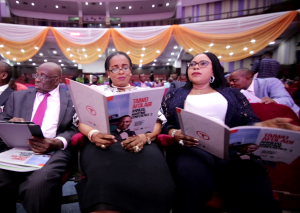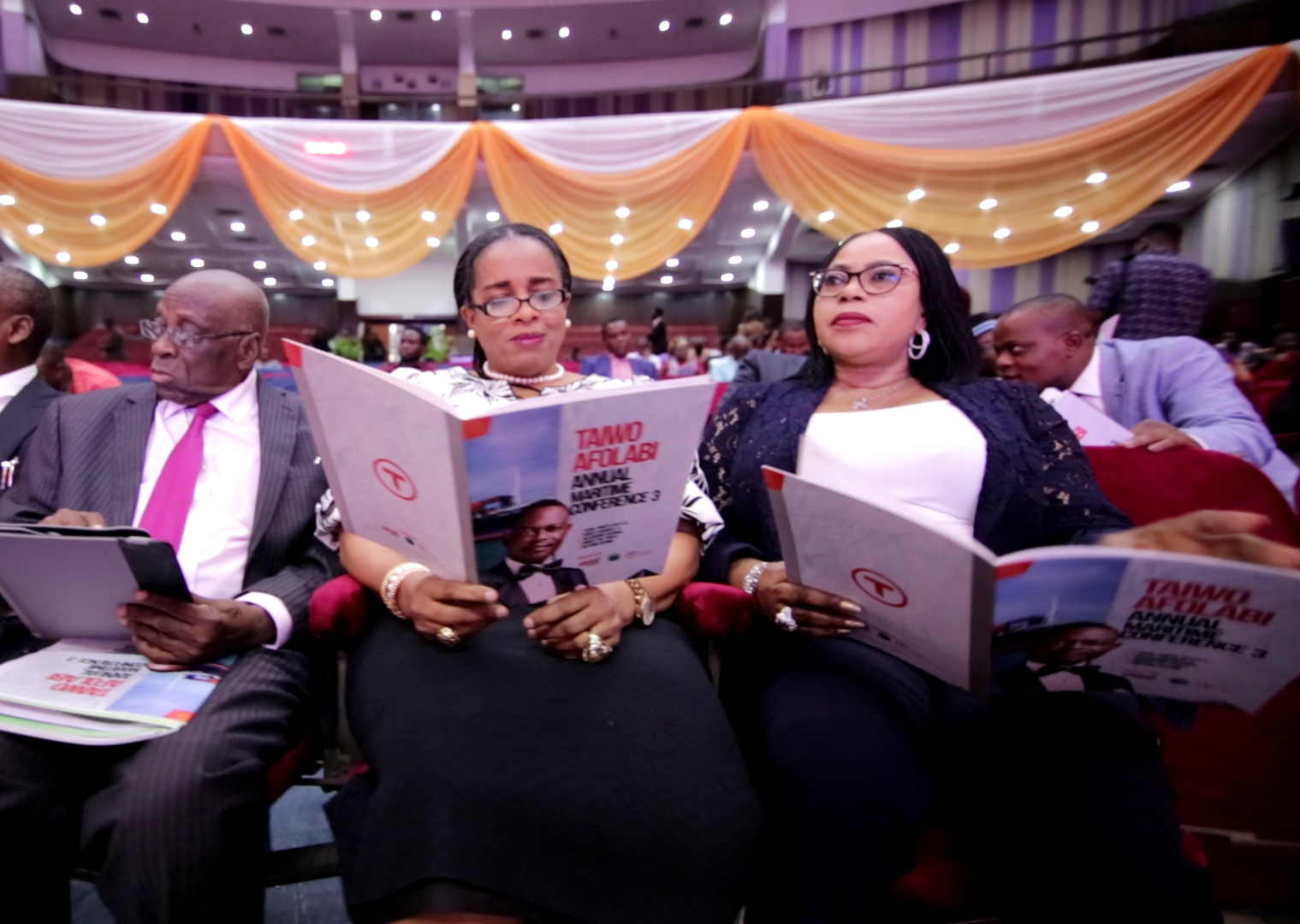Outlines Strategies to Combat Port Costs, Charges
By Shola Fadeyi

L-R: Otunba Kunle Folarin, Chairman , Nigerian Port Consultative Council(NPCC) and presenter of the keynote address,Mrs Obiageli Obi, DG, Nigerian Chamber of Shipping and Princess Vicky Hasstrup , CEO, ENL Consortium and Chairman , Seaport Terminals Operators of Nigeria(STOAN) at the conference held in UNILAG at the weekend in honour of Dr Taiwo Afolabi , Executive Vice Chairman of the Sifax Group.
The Federal Government has been told that it would need to immediately carry out a fresh but an all inclusive reform in the Nigerian Port sector for the industry to be productive , competitive and earn a hub status in the West and Central African sub region.
The Chairman, Nigerian Ports Consultative Council (NPCC), Otunba Kunle Folarin made the observation in a keynote address he presented during the 3rd Annual Maritime Conference, organized at the University of Lagos in honour of the Executive Vice Chairman of the Sifax Group, Dr Taiwo Afolabi by law students of the Institution at the weekend.
Folarin who spoke on the theme, “Port Costs and Ports Charges: A Recurring Decimal under Port Reform Regime” emphasized that the Nigerian Ports must reform and stop deluding itself that it is on course for it not to continue to perform at best a little above average.
According to him , the reforms must be total because it is the only way that the ports can achieve the objectives of building an efficient port environment that Nigeria deserves to meet the performance level of the ports in the sub region now husbanding Nigeria’s destination cargo traffic.
For the desired change to take place in the Nigerian ports , Folarin , who is also the Chairman of the National Seafarers Welfare Board stipulated some Golden Rules which he said must be observed stating that transparency must be entrenched in the concession and port reform process while there must be a Political-will that will entail that all agreed processes and terms must be implemented without delay.
He said the Landlord model must be administered in the very technical, ethical and objective structure , warning that concessionaires obligations are not to replace the responsibilities of the Port Authority which he described as a modern productive infrastructure in an element in the model.
According to him ,corruption which is clearly endemic in the port must be challenged while all documentation must be IT compliant, stating that the terminal operators must consent to yearly operational plans that can be measured even as laws must be made to promote port productivity .fair trade and competition and not to create monopolies.
Still emphasizing on the Golden Rules, Folarin stated that the Port Authority must monitor the performance and compliance of their own obligations as well as those of the concessionaires and other service providers in the enforcement of the concession agreement.
He said the economic regulators must issue guidelines that are open , transparent and enforceable while their operations must exhibit very professional ethical behavior that should not be compromised .
According to him, major restructuring of the port industry must commence with the review of the applicable laws and building of capacity for the management and staff of all the key agencies in the port sector.
Folarin stated that the broad objectives of the earlier reform has been hampered by several fundamental issues from conception, implementation processes and operations of the concession regime saying that the imperative factors of the concession were sidelined for expediency.
He pointed out that port reform is all encompassing and must include the reform of all key institutions in the port system adding that the challenges which was faced before by port authority from cargo handling was enormous.
On port costs , Folarin disclosed that it is a critical factor in the cost of doing business at the ports and not only port charges which relates to tariff , levies and taxes stating that computed costs of delays documentation process , corruption ,bureaucracy and lack of political will are some of the issues that created the problems and will continue to affect the achievements of the objectives.
On strategy to reduce port cost , he said there must be a deliberate government policy to do so, customs duties and taxes must be cut, an effective and effective single window platform must be set up as while the port and shipping sector,(services and costs) port infrastructural development especially in port environment and common user areas must be regulated.
He suggested Port Community System as a framework for stakeholder dialogue to improve service quality and reduce costs as well as the encouragement of PPP in port business , investment in modern facilities and IT enablers and provision of good quality human resources.
The Executive Vice Chairman/CEO of the SIFAX Group,Dr Taiwo Afolabi who was represented by his daughter Mariam had wondered in his keynote address what should actually be the appropriate cost and charge regime that suits all the segments of the industry, especially given that the exchange rate 12 years ago when the port concession was done was between N125-N130 to the dollar as against the current N362 to the dollar.
Panelists who spoke at the conference include Chief Cajetan Agwu , a Director at the Nigerian Shippers’ Council (NSC) who represented the Executive Secretary/CEO of the Council, Barrister Hassan Bello and the former National President of the Association of Nigerian Licensed Customs Agents(ANLCA), Prince Olayiwola Shittu and Mrs Obiageli Obi, the DG of the Nigerian Chamber of Shipping.





